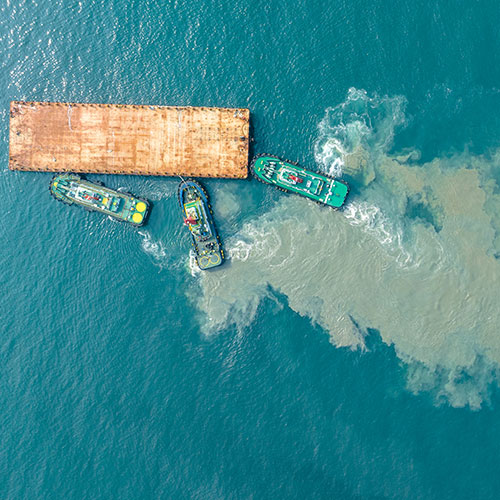

Organizational Impact
Organizations dealing in the marine industry benefit tremendously when their leaders possess a high degree of the inner competencies gained in this seminar. They will be better able to understand the practical, safety and legal aspects of pollution preparedness and response. They will access in-depth thinking potential to make decisions and solve problems more effectively.
- Understanding of the Marine Pollution and how to deal with them
- Improving interface management between departments dealing with marine operations
- Minimizing number of mistakes when working with various stakeholders
- Speeding up processing of the emergency response
- Serving clients more efficiently
- Enhancing human relations within the organization
- Improving vision of future opportunities for development
- Developing necessary employee’s skills
- Saving costs
Upon the successful completion of this course, each participant will get knowledge about:
- The nature of casualties involving ships, pollution risks from vessels in distress, international, regional and local bodies, marine pollution control law, classification societies and salvers.
- Air pollution problem and overview of regulatory and non-regulatory emission control initiatives
- Environmental threats from the use of ballast water, anti-fouling systems, chemical pollution, bilge water/waste oil, ship scrapping and recycling.
- The fundamentals of oil pollution, pollution risks in offshore oil and gas operations
- The international instruments, the concept of limitation of liability in shipping, assessment and handling of claims, criminal liability, including prosecution and detention, US approach to liability and compensation and presents synthesis and application of lessons learnt through case studies
Personal Impact
This training course teaches the competencies that enable leaders to:
• The various pollution incidents, frequency rates, and historical rates relevant to the maritime industries
• The applicable standards that apply to the maritime industry,
• How to identify pollution and recommend control techniques that can prevent injuries related to maritime operations
• Become more knowledgeable of the standards that apply to the maritime industry.
• Determine how the standard applies to specific operations on the ships and in marine terminals.
• Learn best practices for pollution control in the industry.
• Recognize and evaluate various types of pollution in the industry.
This training seminar will greatly benefit all individuals who wish to improve their leadership skills and develop their personal power and effectiveness:
• Managers
• Team Leaders
• Supervisors
• Professionals
• Technical Staff
• Superintendents
• Operators
• Officers
• Procurement professionals
• Suppliers
• Planners
• Inventory professionals
DAY 1
Pollution in Context: Causes and Effects, Governance, Regulations and Enforcement
• Environmental Impact of Terminal/Marine Operations
• Efficient Management & Pollution Control
• Energy Efficiency & Carbon Footprint Reduction
• Implementation of Sustainable Practices in Terminal/Marine Operations
DAY 2
Air Pollution and Greenhouse Gas Emissions
• We Can Define Pollutants in Multiple Ways
• Differentiate Air Pollution and Greenhouse Gases
• Minute Particles of Sulphur Compounds
• How Sulphate Aerosols Mix with the Atmosphere
• How to cut Pollution and Greenhouse Gases
• Misleading to Think About Implications in Isolation
• “Urgency for Reducing C02 in the Atmosphere”
DAY 3
Ballast Water and Other Marine Pollutants
• What is Ballast Water?
• What is the Ballast Water Management Convention?
• The Use of Ballast Water Management and the Global Response to Ballast Water Problem
• Nutrients, Marine Debris, Oil and Related Chemicals, Metals
• Pesticides and Industrial Organic Chemicals, Bioaccumulation & Biomagnification, Biological Pollution
DAY 4
Oil Pollution and Offshore Activities, Measurement and Management Systems
• Overview of Oil Spill Dynamics: Understanding the Physical & Chemical Properties of Oil Spills
• Types of Oil Spills: Discussion on Various Sources of Oil Spills Including Drilling Transportation & Storage
• Risk Assessment in Oil Spill Scenarios: Identifying Potential Risks & the Environmental Impact of Oil Spills
• In-Water Behavior of Oil: Studying how Oil Behaves in Different Water Conditions
• Global & Regional Oil Spill Response Protocols: Review of International & Local Guidelines for Handling Oil Spills
• Remote Sensing & Surveillance: Utilizing Drones & Satellite Imagery to Monitor Oil Spills
• Integration of IT Tools in Spill Response: How Software & Response Tools can Optimize Spill Management
• Command & Control Structures: Establishing Roles & Communication Hierarchies During a Spill Response
Day 5
Legal Issues, Including Insurance and Compensation Target Audience: As per nomination
• Legal & Regulatory Framework: Understanding the Legal Implications & Compliance Requirements Post-Spill
• Public Affairs
• Review of the Response and Cost Recovery
• Preparation and Submission of Claims from Oil Pollution
• Liability and Compensation
• National and Regional Legislation including USA
CDGA attendance certificate will be issued to all attendees completing minimum of 80% of the total course duration.
| Code | Date | Venue | Fees | Register |
|---|---|---|---|---|
| MAR107-02 | 10-05-2026 | Riyadh | USD 5450 | |
| MAR107-03 | 13-09-2026 | Dubai | USD 5450 | |
| MAR107-04 | 07-12-2026 | Johannesburg | USD 6950 |
Providing services with a high quality that are satisfying the requirements
Appling the specifications and legalizations to ensure the quality of service.
Best utilization of resources for continually improving the business activities.
CDGA keen to selects highly technical instructors based on professional field experience
Since CDGA was established, it considered a training partner for world class oil & gas institution
3012, Block 3, 30 Euro Business Park, Little Island, Co. Cork, T45 V220, Ireland
Mon to Fri 09:00 AM to 06:00 PM
Contact Us anytime!
Request Info